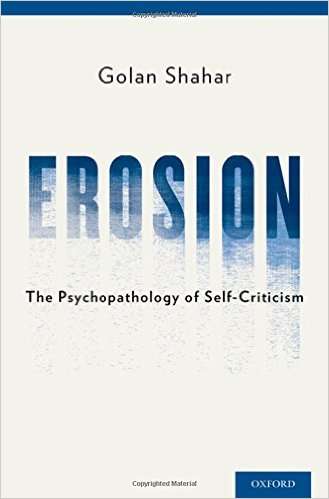Researcher reveals that self-criticism can be lethal in new book

A new book by Prof. Golan Shahar of Ben-Gurion University of the Negev (BGU) reveals that self-criticism can be both mentally and physically harmful, leading to mental disorder, chronic fatigue, chronic pain, and even suicide.
The book, Erosion: The Psychopathology of Self-Criticism, (Oxford University Press 2015), summarizes two decades of scholarship—empirical and theoretical research and clinical work—conducted by Prof. Shahar, a clinical-health psychologist. Prof. Shahar offers a novel theory of how self-criticism comes about in individuals, families and societies. He provides guidelines for an integrative and comprehensive psychotherapy with self-critical adolescents and young adults.
"Self-criticism is a personality trait characterized as the tendency to set unrealistically high standards for one's self and an expression of hostility and derogation when these high standards are, inevitably, not met," Shahar explains. "This type of behavior leaves people depressed, anxious, suffering from other symptoms, and potentially suicidal."
Throughout the book, Prof. Shahar identifies the mechanisms through which self-criticism confers vulnerability to psychopathology. Self-criticism propels people to involve themselves in stressful events such as rejection by others, relationship breakups and professional failures to avoid engaging in the positive life experiences they feel they do not deserve.
This form of dangerous self-criticism is psychologically different from the transient "fish for compliments" type, which he argues is not pathological, unlike its more harmful counterpart.
Prof. Shahar has dedicated the book to the memory of his Yale mentor, Prof. Sidney J. Blatt, whom he calls, "one of the greatest clinical psychologists of our time."
Golan Shahar Ph.D. is a professor of clinical-health and developmental-health psychology in the BGU Department of Psychology in Beer-Sheva, Israel. He is the founding director of the BGU Center for the Advancement of Research on Stress (BGU-CARES), and directs the Stress, Self and Health (STREALTH) Lab. Prof. Shahar has authored more than 130 publications/book chapters in the fields of personality, stress, psychopathology, psychosomatics, and psychotherapy, and currently serves as the chief editor of the Journal of Psychotherapy Integration. He also serves as visiting professor of psychiatry at Yale University School of Medicine.
More information: www.amazon.com/Erosion-Psychop … Shahar/dp/019992936X














